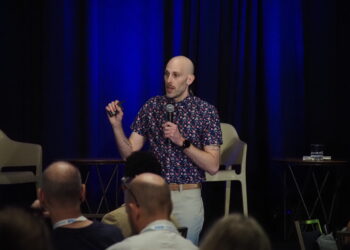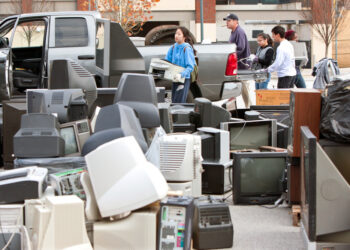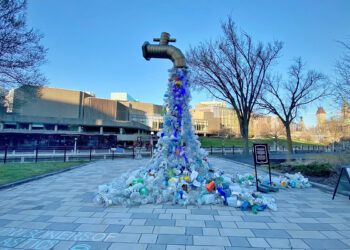More compensation for e-scrap could help create a circular economy for electronics in Africa, but significant barriers remain, according to Footprints Africa.
The nonprofit organization’s report, “The electronics afterlife: Is e-waste compensation a stepping stone to a circular electronics sector in Africa?” looks at how voluntary compensation programs, like those run by Netherlands-based Closing the Loop, could tackle the growing problem of e-scrap recycling and disposal in Africa.
Footprints Africa aims to promote “sustainable, scalable and inclusive approaches to the development of local African economies and prove that business can be a force for good at scale.” The report was funded by the CTL Foundation, Closing the Loop’s nonprofit arm.
The compensation or offset model works by adding an additional charge when a customer, such as in Europe, purchases a new electronic product. That charge is enough to cover the cost of collecting the device at the end of its life and is directed toward collecting an equivalent amount of e-scrap from a country that lacks a safe recycling system today.
Closing the Loop started in 2014 and has processed 5.6 million devices via projects across more than 10 countries in Africa, with a current emphasis on Ghana, Nigeria and Cameroon. Its customers include Vodafone and the Dutch government.
Closing the Loop’s model currently handles phones, laptops, tablets, batteries and computer screens, “the scope is potentially much larger,” the report stated.
“This raises the question of how the model might be expanded to other sectors for greater impact, commercial return and reduction of environmental harm,” the authors wrote. “In turn that would mean working out a model for equipment that has a lower value to weight ratio than consumer electronics, in some instances.”
The report noted that there is no one perfect solution, but e-scrap compensation is an “imperfect transition step, setting the foundations to reshape African value chains along circular lines.”
Extended producer responsibility policies could also help but “are a long way from addressing the planned obsolescence, poor design choices, inefficiencies in the value chain and negative externalities which just aren’t priced in by electronics producers,” according to the report.
“One important thing to note is that e-waste compensation does not free producers from their legal obligations under extended producer responsibility schemes in countries where their products are sold,” it stated. “It is a voluntary complement by participating businesses/customers.”
Getting the price right is critical, the authors added, as the prices must be low enough for customers to be willing to pay when they buy a new device, but also high enough to provide a viable alternative to the informal market. However, prices cannot be so high that they divert new phones to recycling before their time.
The authors recommended that African governmental institutions work to calculate the true cost of safely processing material locally and create an “enabling environment” to promote investment into local and regional processing capabilities, such as setting clear and uniformly applied regulation and creating clear roles and licenses for informal and formal jobs in the sector. Africa-based e-scrap processors, in addition, should measure and report data on tonnage and processing costs, according to the report.
European governments and institutions should consider collection and recycling factors in Africa when regulating the electronics sector, including product design, right to repair and end-of-life management, the report added, level the playing field by allowing more start-up recycling industries, and review the impact of EU-wide EPR and mandated e-scrap compensation as a transition measure.
The role of electronics producers and importers include designing for repair and recycling, setting clear targets and performance updates on circularity and to support e-scrap compensation as “a step in the transition.”
“There is a need for much better understanding and collaboration between the people who are aiming, in different ways, to address the global mess that is e-waste,” the report stated. “There is often the challenge of ‘friendly fire’ when talking about pathways to real sustainability. Rather than viewing this as an impasse, we believe this opens up a series of options for collective problem-solving.”





























